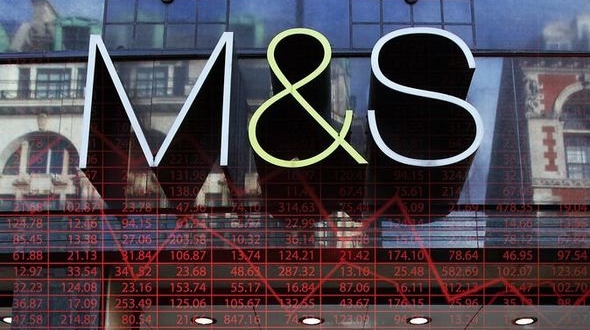Marks and Spencer has reported a 0.6 percent fall in UK revenue for the three months to the end of December, predominantly driven by a 3.7 percent slump in its clothing and home sales. On a like-for-like basis, which strips out the impact of stores closing and opening, UK sales grew 0.2 percent, with revenue from the clothing and home ranges falling 1.7 percent. M&S clothes stores struggled again, with sales in the clothing and home division dropping 2.7 percent to £1.1billion.
Online clothes sales also disappointed, with online clothing and home revenue in the UK up by 1.5 percent – lower than expected.
But M&S saw its food segment deliver the standout performance over Christmas, growing 1.5 percent to £1.7billion over the three-month period.
This however wasn’t enough to cheer investors, with shares falling seven percent in early trading.
The retailer’s international division saw a 2.3 percent drop in total revenue to £251million, and a fall of 0.7 percent across the entire group.

Marks and Spencer revealed a revenue drop in the third quarter of its financial year (Image: GETTY)
The popular retailer said it is improving its search and rationalisation functions, and has also launched an option for customers to pay in instalments
M&S has not changed its guidance for the full year, but warned gross margins are likely to be around the lower end of what had been forecasted.
Chief executive Steve Rowe said “disappointing one-off issues” such as waste in the food business and the performance of its gifts range “held us back from delivering a stronger result”.
But he said: “The food business continued to outperform the market, and clothing and home had a strong start to the quarter, albeit this was followed by a challenging trading environment in the lead-up to Christmas.”

M&S saw sales in its clothing and home division struggle once more (Image: GETTY)
Richard Lim, chief executive of consultancy Retail Economics, said: “Food performed particularly well, benefiting from stronger underlying household finances, but consumers also responded positively to more competitive pricing.
“It appeared that shoppers were prepared to indulge that little bit more this Christmas on food if they spotted value for money.”
He added: “While clothing and home lagged overall growth, it still improved on previous performances. The major disappointment came in the online business that barely showed any meaningful signs of growth.
“Integrating a seamless digital proposition remains the key challenge for the retailer.”

The retailer was however cheered by encouraging food sales (Image: GETTY)

Steve Rowe insisted the food business had ‘continued to outperform the market’ (Image: REUTERS)
Nigel Frith, a senior market analyst at asktraders.com, said: Marks and Spencer will be glad to see an end to 2019, a challenging year that saw it relegated from the FTSE 100 for the first time in history.
“Any hopes of a solid end to that year spring boarding the share price into 2020 have been dashed, in a disappointing update from the key Christmas period.
“The clothing and home division may well be turning around, but the progress is frustratingly slow as same store sales in this area declined a worse than expected -1.7 percent, although an improvement on last year’s -2.4 percent decline.
“The food business often saves the day at Marks & Spencer, particularly around Christmas as customers treat themselves.

Last year proved to be the worst on record for sales on the UK high street, according to a retail lobby group (Image: GETTY)
“Same store sales were up meaning an increase for two consecutive quarters, however, this wasn’t enough to save the food and clothes retailers from joining fellow retailers in the Christmas doldrums.
The disappointing results from M&S comes after a retail lobby group warned 2019 proved to be the worst year on record for sales on the UK high street, with growing evidence Christmas failed to deliver much-needed cheer for the high street.
The British Retail Consortium (BRC)/KPMG Retail Sales Monitor showed a 0.1 percent fall in total sales last year compared with growth of 1.2 percent in 2018.
This is the weakest performance since comparable records began in 1995.
There was 0.9 percent fall in sales across November and December while on a like-for-like basis, sales were down 1.2 percent on the same two-month period in 2018.
BRC chief executive Helen Dickinson said: “The public’s confidence in Britain’s trade negotiations will have a big impact on spending over the coming year.
“There are many ongoing challenges for retailers: to drive up productivity, continue to raise wages, improve recyclability of products and cut waste.
“However, this takes resources, so it is essential the new Government makes good on its promise to review, and then reform the broken business rates system which sees retail pay 25 percent of all business rates, while accounting for five percent of the economy.”
